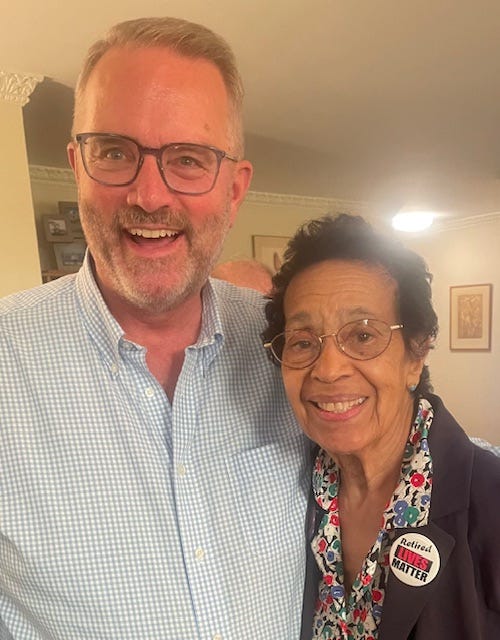Kurt Meyer writes a weekly column for the Nora Springs – Rockford Register and the Substack newsletter Showing Up, where this essay first appeared. He served as chair of the executive committee (the equivalent of board chair) of Americans for Democratic Action, America’s most experienced liberal organization.
By the time you read this, I will have been in Washington D.C. to participate in the annual awards gathering of Americans for Democratic Action (ADA). I’ve attended these events for the last dozen years although, as for most organizations, the ADA get-together went “virtual” during the COVID-19 pandemic. Now, it’s a hybrid, virtual/in-person event.
Americans for Democratic Action was founded in the aftermath of World War II by a distinguished group of progressives, led by Eleanor Roosevelt, Reinhold Niebuhr, Arthur Schlesinger, Jr., Walter Reuther, and Hubert Humphrey, then Minneapolis mayor. This gathering is special for me, for although I’ve introduced numerous honorees before, this year I received ADA’s “Timeless Liberal” award.
I feel somewhat sheepish about this honor since many of my ADA colleagues have been more faithful, more generous, and more persistent in their organizational involvement. I know this because they’ve helped lift my game, motivating me and supporting me in my role of chair of the ADA Executive Committee, a post I held for six years. (I announced my resignation as chair several months ago, effective July 10.)
To receive an award with the word “liberal” attached prompted me to do some homework to better understand what was encompassed in this term. Let me draw on remarks delivered by John F. Kennedy, accepting the Liberal Party nomination for president in September 1960.
But, if by a “Liberal,” they mean someone who looks ahead and not behind, someone who welcomes new ideas without rigid reactions, someone who cares about the welfare of the people—their health, their housing, their schools, their jobs, their civil rights, and their civil liberties —someone who believes that we can break through the stalemate and suspicions that grip us in our policies abroad, if that is what they mean by a “Liberal,” then I’m proud to say that I’m a “Liberal.” […]
I believe in human dignity as the source of national purpose, in human liberty as the source of national action, and the human heart as the source of national compassion, and in the human mind as the source of our invention and our ideas. […] liberalism is not so much a party creed or a set of fixed platform promises as it is an attitude of mind and heart, a faith in man’s ability through the experiences of his reason and judgment to increase for himself and his fellow men the amount of Justice and freedom and brotherhood which all human life deserves. […]
I believe for these reasons, that liberalism is our best and our only hope in the world today. For the liberal society is a free society, and it is at the same time and for that reason a strong society.
“Someone who cares about the welfare of the people” and “an attitude of mind and heart.” Powerful thoughts, bringing to mind a quote from ADA founder Humphrey, encapsulating much of what he stood for: “The moral test of government is how it treats those in the dawn of life, the children; those in the twilight of life, the elderly; and those in the shadows of life, the sick, the needy, and the handicapped.”
So here I am, spending a warm summer evening in a room filled with liberals. And a primary topic of conversation: will/can President Joe Biden’s candidacy survive? There are many different opinions, with a chance that clear(er) answers will emerge between the time I write this and you have a chance to read it.
ADA board members were polled early this week about taking a formal organizational position. The proposed resolution: “We (the board of Americans for Democratic Action) urge President Biden to withdraw from the presidential race, thereby enabling Democratic Party national convention delegates to nominate an alternate candidate.”
Ultimately, the organization did not take a position, since a 60 percent majority is required for such matters. Our tally fell short of this threshold, possibly (or probably) reflecting a lack of national consensus around this topic.
Meanwhile, the quadrennial “most important election of our lifetime” (aren’t they all?) is less than four months away. It’s time we all start paying close attention.

